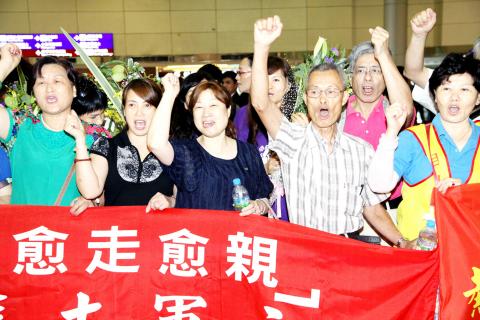The number of Chinese businesspeople and white-collar workers traveling to Taiwan on business visas, which surpassed 110,000 last year, poses a growing threat to the nation’s job market and security, political observers said.
National Immigration Agency (NIA) statistics show the number of Chinese business travelers has increased from 15,000 in 2005 to 34,000 in 2008, 77,000 in 2013 and 111,422 last year.
The figure is expected to balloon if the cross-strait service trade pact is passed, which would allow more businesspeople and white-collar employees to work in this country, lowering wage levels, worsening youth unemployment and threatening national security, National Cheng Kung University law professor Hsu Chung-hsin (許忠信) said.

Photo: AFP
Hsu said that following an amendment to the Entry Permission to Taiwan Area for the People from Mainland China (大陸地區人民進入台灣許可辦法) in 2013, the immigration agency lifted restrictions on companies eligible for business entry, including the requirement of a minimum annual revenue of NT$10 million (US$317,900) and a maximum of 400 entries per year.
In addition to the 103,742 business travelers who stayed less than six months last year, 7,680 Chinese were employed in the name of “fulfilling a contract,” such as international job transfers, goods inspection, technical counseling and after-sale service, Hsu said.
Chinese businesspeople and white-collar workers can initially stay in Taiwan for three years and are eligible to have their stay extended, with no restriction on the number of renewals, he said.
The immigration agency and Ministry of Labor are unable and unwilling to deal with Chinese workers in Taiwan, Taiwan Labor Front secretary-general Son Yu-liam (孫友聯) added, citing an incident in New Taipei City in December last year in which a Chinese technician died while installing an elevator, proving that Chinese are working in Taiwan.
Son said the ministry requires that foreign workers be paid a monthly salary of at least NT$47,971 and that employers purchase labor insurance for their employees against occupational injuries, but that Chinese businesspeople are not under the jurisdiction of the ministry and are not subject to employment regulations.
Chinese businesspeople and white-collar workers provide a convenient option for employers who wish to cut costs, Son said.
Hsu cited a recent article in Defense News that said Taiwan’s open policy toward China helps pave the way for the Chinese People’s Liberation Army to conduct clandestine activities to infiltrate Taiwanese society.
Chinese businesspeople and white-collar workers could pose an even greater threat to Taiwan’s national security than ordinary Chinese tourists, as they can stay in Taiwan for an extended period of time and become a “Chinese fifth column,” Hsu said.
The NIA said that easing entry regulations for Chinese businesspeople is aimed at facilitating small and medium-sized firm’s operations, and that it would redouble its inspections of such visitors.

ENDEAVOR MANTA: The ship is programmed to automatically return to its designated home port and would self-destruct if seized by another party The Endeavor Manta, Taiwan’s first military-specification uncrewed surface vehicle (USV) tailor-made to operate in the Taiwan Strait in a bid to bolster the nation’s asymmetric combat capabilities made its first appearance at Kaohsiung’s Singda Harbor yesterday. Taking inspiration from Ukraine’s navy, which is using USVs to force Russia’s Black Sea fleet to take shelter within its own ports, CSBC Taiwan (台灣國際造船) established a research and development unit on USVs last year, CSBC chairman Huang Cheng-hung (黃正弘) said. With the exception of the satellite guidance system and the outboard motors — which were purchased from foreign companies that were not affiliated with Chinese-funded

PERMIT REVOKED: The influencer at a news conference said the National Immigration Agency was infringing on human rights and persecuting Chinese spouses Chinese influencer “Yaya in Taiwan” (亞亞在台灣) yesterday evening voluntarily left Taiwan, despite saying yesterday morning that she had “no intention” of leaving after her residence permit was revoked over her comments on Taiwan being “unified” with China by military force. The Ministry of the Interior yesterday had said that it could forcibly deport the influencer at midnight, but was considering taking a more flexible approach and beginning procedures this morning. The influencer, whose given name is Liu Zhenya (劉振亞), departed on a 8:45pm flight from Taipei International Airport (Songshan airport) to Fuzhou, China. Liu held a news conference at the airport at 7pm,

Taiwan was ranked the fourth-safest country in the world with a score of 82.9, trailing only Andorra, the United Arab Emirates and Qatar in Numbeo’s Safety Index by Country report. Taiwan’s score improved by 0.1 points compared with last year’s mid-year report, which had Taiwan fourth with a score of 82.8. However, both scores were lower than in last year’s first review, when Taiwan scored 83.3, and are a long way from when Taiwan was named the second-safest country in the world in 2021, scoring 84.8. Taiwan ranked higher than Singapore in ninth with a score of 77.4 and Japan in 10th with

GRIDLOCK: The National Fire Agency’s Special Search and Rescue team is on standby to travel to the countries to help out with the rescue effort A powerful earthquake rocked Myanmar and neighboring Thailand yesterday, killing at least three people in Bangkok and burying dozens when a high-rise building under construction collapsed. Footage shared on social media from Myanmar’s second-largest city showed widespread destruction, raising fears that many were trapped under the rubble or killed. The magnitude 7.7 earthquake, with an epicenter near Mandalay in Myanmar, struck at midday and was followed by a strong magnitude 6.4 aftershock. The extent of death, injury and destruction — especially in Myanmar, which is embroiled in a civil war and where information is tightly controlled at the best of times —